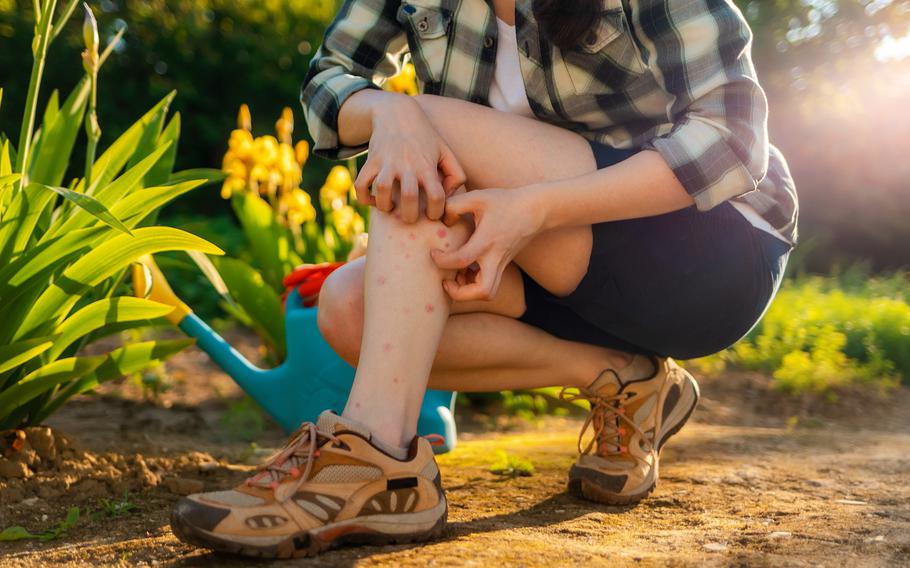
(iStock)
During the summer months, I envision myself wearing a floral sundress and straw hat, with sun-kissed skin and hair, strolling lazily along a sandy shoreline, selecting ripened tomatoes and zucchini at a local farmer’s market and sipping wine in an Adirondack chair at an evening concert under the stars …
But inevitably, these dreamy visions are thwarted by one minuscule yet evil creature who loves to spoil my summer fun — The dreaded mosquito.
I am undoubtedly a “mosquito magnet” — one of those unfortunate humans that always seems to get bit mercilessly when others are enjoying the great outdoors without a care in the world. When pesky mosquitoes strike, I slap and stomp, but almost always fail to squish them in the act. They fly off sniggering and glancing back at me with their compound eyes, knowing they haven’t forgotten their manners. They leave me, their host, with a sinister gag gift — inflamed, itchy, red welts.
Thanks for the hostess gift, mosquitoes; much appreciated.
I try to resist scratching the bites that rise on every exposed, and strangely sometimes unexposed, area of my skin. Mostly, I don’t want to give the little bastards the satisfaction, but also, I want to prevent the bumps from becoming more inflamed. But, alas, I can’t stop scratching. Before I know it, the bumps swell, ooze and scab over, becoming chronically itchy wounds that last for weeks.
So much for that sun-kissed summer skin I dream of.
All joking aside, mosquito-borne illnesses kill more than 1 million people annually and infect another 700 million, making the mosquito the deadliest creature on Earth. Even scarier, there are more than 3,500 species of mosquitoes in the world, and they exist on every continent except Antarctica. Obviously, this includes every CONUS and OCONUS duty station around the globe.
Mosquitoes bite with the serrated end of long, pointed mouth parts called probosces, which pierce skin to find capillaries from which they can draw over three times their body weight in blood, all while pumping analgesic saliva into their hosts. Mosquitoes can pass the deadly germs and parasites that cause malaria, yellow fever, encephalitis, West Nile virus, Zika, chikungunya and dengue to human hosts through its infected saliva. How horrifying!
But let’s not contract a case of hysteria over mosquito-borne malaria. According to science, we don’t need to bathe in DEET, ensconce our bodies in shrink wrap, and hide indoors.
The vast majority of mosquitoes don’t cause diseases. They are just a nuisance. As for the more dangerous varieties of mosquitoes, a few simple precautions can prevent bites, even for magnets like me.
Of the thousands of species worldwide, only 6% bite humans. Of those, only half, the females, do all the biting. Of 200 species in the U.S., only about 12 cause any serious trouble for humans. The 12 trouble-makers fall into three basic genera: Culex can cause West Nile virus, encephalitis and canine heart worm. Anopheles can cause malaria (rarely in the U.S.) and canine heart worm. Aedes can cause yellow fever, West Nile, Zika, chikungunya, encephalitis and dengue.
Although dangerous mosquitoes may be prevalent in some overseas duty stations, especially those in tropical and sub-tropical climates, the U.S. military has a long history of researching, developing and employing countermeasures for insect-borne illnesses. Currently, the
U.S. military uses all available vaccines to prevent infections like chikungunya, Japanese encephalitis, and yellow fever overseas, and mandates the use of doxycycline to prevent malaria.
Prevention of bites isn’t rocket science; however, it’s key to preventing mosquito-borne illnesses no matter where you’re stationed or deployed. The Centers for Disease Control recommend removing and/or treating standing water where mosquitoes lay eggs; keeping doors and windows screened or closed; using insect repellants (DEET, Picaridin, IR3535, lemon eucalyptus oil, para-menthane-diol, 2 undecanone); and wearing light-colored long sleeves, long pants and socks treated with insect repellants.
Looks like I won’t be wearing any sundresses while flitting through fields of green this summer, but things could be worse. Truth be told, it’s not so bad being a mosquito magnet. At least I know someone out there thinks I’m really sweet.
Read more at themeatandpotatoesoflife.com and in Lisa’s book, “The Meat and Potatoes of Life: My True Lit Com.” Email: meatandpotatoesoflife@gmail.com